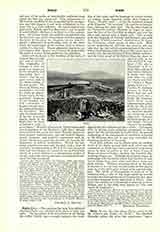

Nairn, (NAIN), the city where Christ raised to life the widow’s son (Luke, vii, 11-17). The Midrash (Bereshit rabba, 88) gives the significance “able” to a place called Hebrew: N`YM (Naim) in the territory of Issachar, in Galilee. Eusebius and St. Jerome (Onomasticon) place Naim south of Mount Thabor, and not far from Endor. Now, opposite to Thabor, and a mile and a half north of Endur (doubtless the Biblical Endor), lies a village called Nain (“pleasantness”). It is situated on the north western ridge of Jebel Dahy, the Little Hermon, and commands a magnificent view. There are traces of ruins beyond its boundary to the north, but no sign of fortifications. “The gate of the city” (Luke, vii, 12) might have belonged to a wall of enclosure, built to protect the place against marauding tribes, as was often the case in the East. A steep path leads up to the village, passing by the site of an ancient church which had been converted into a mosque, “Moukam Lidna Aisa” (Oratory of the Lord Jesus). The mosque, having fallen into ruins, was replaced by another in the vicinity. In 1880 the Franciscans bought the ruins of the first building, and erected thereon a chapel. Not far away may be seen Jewish rock-tombs. Thus the details of Naim’s graphic story find an easy localization.
BARNABAS MEISTERMANN

